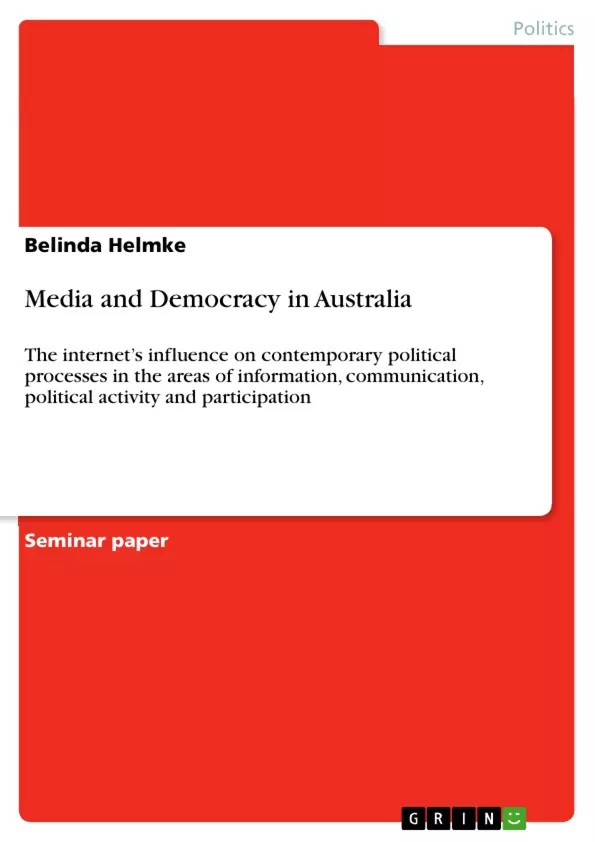When speaking about democracy one has to be careful to distinguish between its two key areas: direct democracy and representative democracy. Direct democracy is largely associated with self-government of the people in ancient Greece. This Athenian democracy is something which, as population of states grew, was increasingly difficult to sustain. In, for example, Australia with a population of 19 million people direct self-rule which implies ”time-consuming and unwieldy procedures”, with the likely effect of paralysing and not enhancing governmental decision-making processes, is largely unthinkable. Hence, today in the 21st century when one speaks of democracies what is largely meant is a representative democracy. Although remnants of direct democracy remain in aspects such as referendums, generally voters hand over their power in regular elections to representatives to rule on their behalf.
The emergence of the internet has inspired many critics to believe that it can be the answer to overcoming what they see as the temporary solution of representative democracies. They believe that the new media, the internet, will lead to a future in which ”major policy decisions can be instigated, formulated, and decided by direct democracy.”
Inhaltsverzeichnis (Table of Contents)
- I. Introduction
- II. The internet: A Fourth Estate in disguise or a radically new media?
- The internet: A Fourth Estate in disguise or a radically new media?
- Critics and sceptics of the internet
- III. The internet and democracy today
- The internet and democracy today
- Information, communication, political activity and participation
Zielsetzung und Themenschwerpunkte (Objectives and Key Themes)
This paper analyzes the influence of the internet on contemporary political processes in Australia, focusing on how it impacts information, communication, political activity, and participation. It examines the potential of the internet to improve democracy by creating a more engaged and active citizenry.
- The internet's potential to enhance democracy by increasing citizen engagement.
- The role of the internet as a "Fifth Estate" and its impact on traditional media.
- The challenges posed by the internet, including fragmentation, segmentation, information overload, and commercialization.
- The impact of the internet on political processes in the areas of information, communication, political activity, and participation.
- The relationship between the internet and the traditional media in shaping political discourse.
Zusammenfassung der Kapitel (Chapter Summaries)
The first chapter introduces the concept of democracy and its two key areas: direct democracy and representative democracy. It explores the rise of the internet and the hopes that it will revive direct democracy, highlighting the debate about the internet's potential to improve democracy in an age of political disillusionment. It also discusses the challenges of the internet's influence on democracy, including the concerns about its impact on the traditional media.
The second chapter delves into the role of the internet as a potential "Fifth Estate." It examines the traditional media's role in democracy and explores the critique that the media is no longer fulfilling its watchdog role. The chapter then analyzes the internet's unique features and potential to overcome the limitations of traditional media, highlighting its decentralised and non-hierarchical communication model.
Schlüsselwörter (Keywords)
This paper focuses on key concepts such as democracy, representative democracy, the internet, media, communication, political activity, participation, citizen engagement, Fifth Estate, traditional media, information overload, commercialization, fragmentation, segmentation, and the Australian political landscape.
Frequently Asked Questions: Media and Democracy in Australia
What is the difference between direct and representative democracy?
Direct democracy involves self-government by the people (like in ancient Greece), while representative democracy (used in Australia) involves voters electing officials to rule on their behalf.
How does the internet impact political participation in Australia?
The internet has inspired hopes of reviving direct democracy by allowing citizens to instigate and decide policy decisions, though it also brings challenges like information overload.
What is the "Fifth Estate"?
The "Fifth Estate" refers to the potential of the internet and social media to act as a watchdog and alternative to traditional media (the Fourth Estate).
What are the main risks of digital media for democracy?
Key risks include fragmentation of the public sphere, commercialization of information, and the creation of "echo chambers" through segmentation.
Is direct democracy feasible in modern Australia?
With a population of millions, direct self-rule is considered unwieldy for major decisions, but digital tools are explored as a way to enhance engagement within the representative framework.
- Quote paper
- Dr. Belinda Helmke (Author), 2002, Media and Democracy in Australia , Munich, GRIN Verlag, https://www.grin.com/document/174543



